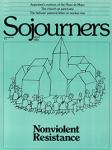In the pages of Sojourners we often speak of the awakening that is occurring in many sectors of the church's life. Almost everywhere we see Christians becoming more hungry for justice, more intent upon peace.
We are rediscovering the biblical message in fresh ways. As the historical crisis we face becomes ever more clear, so do biblical passages about the oppression of the poor, the arrogance of power, and the idolatry of military might. The vision of justice and peace we so desperately need is rooted not in secular ideologies but in the Bible.
As that vision has become clearer to us, a central question has emerged: how shall we pursue that vision? By what means shall we labor for justice and seek peace? Does the gospel tell us only where we should go, or does it also give us insight into the way we should get there?
In Western democracies the electoral process is always considered the primary way of effecting social change. But the limitations of the electoral process are many. Powerful vested interests, both economic and political, dominate and usually control the system, which most often becomes more a way of frustrating change than facilitating it.
Electoral options should not be rejected out of hand but can be pursued to the limits of their possibilities. However, serious social change will usually require much more than traditional political methods. History has shown that strong grassroots social movements are usually required to move entrenched systems. This is especially true when the injustice being attacked is deeply rooted, or when the habits and assumptions being challenged are embedded in both the structures and the mindset of a society.
It is out of our experience of these realities that many of us have been increasingly drawn to a path that is at the same time a method of social change and a way of life. That path is nonviolent resistance.
Many of us have been deeply inspired by the life of Martin Luther King, Jr. and the legacy of the civil rights movement which he led. The epic film Gandhi, now flashing across the nation, is awakening in us hopeful possibilities. We are learning that the history of nonviolent action is both rich and deep. Examples of nonviolent resistance to tyranny and violence, both in the past and in the present, are informing and inspiring our own struggles.
But most of all, we are being led back to Jesus and his way of the cross. Virtually no one denies the nonviolence of Jesus. But most often his way of suffering love has been ignored or dismissed as irrelevant to political struggle. What we are finding is that the cross of Christ is not only the means of our salvation but is also intended to be the pattern for our discipleship. That fact has as much political meaning as personal significance for our lives.
The historical crisis that we face and the clear command of the one whom we call Lord require that we take up the cross as the means of seeking justice and making peace in our dangerous global situation.
This issue of Sojourners, and the succeeding one, will be devoted to these themes. This issue focuses on the history and practice of various forms of nonviolent resistance. The May issue will deal specifically with civil disobedience--biblically, historically, politically, and pastorally. It will include a rich offering of personal testimonies and perspectives from many people who are engaging in civil disobedience.
We believe that these questions are very important ones that will no doubt significantly affect many of our lives in the years ahead. They deserve much prayer, study, and discernment. To this end we offer the next two issues of Sojourners.
Jim Wallis is editor-in-chief of Sojourners.

Got something to say about what you're reading? We value your feedback!
